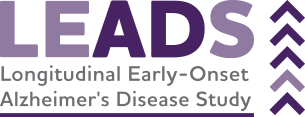
For Health Care Professionals
Early onset Alzheimer’s disease is a devastating, but often overlooked disease variant that affects about 5% of all symptomatic Alzheimer’s disease individuals (~200,000-300,000 cases in the United States). There is a common misconception that all early onset Alzheimer’s disease patients carry a mutation of one of the three autosomal dominant Alzheimer’s disease genes (APP, PSEN1 and PSEN2). In fact, less than 10% of these cases carry a mutation in one of these genes.
As health care providers, we still know very little about the sporadic forms of early onset Alzheimer’s disease. This is, in part, because many patients with the disease are either misdiagnosed or excluded from research studies due to their young age or atypical disease presentation.
Led by Indiana University School of Medicine, the Longitudinal Early-Onset Alzheimer’s Disease Study (LEADS) is the largest, most comprehensive study of individuals with early-onset disease. We are enrolling 850 cognitively impaired patients and 100 cognitively normal adults ages 40-64 years old.
We encourage you to discuss the importance of clinical research with your patients and to refer individuals who may be interested in learning more.
What can my patient expect?
Cognitively impaired participants will attend annual follow-up visits every year until the end of the study, and cognitively normal participants will attend three visits over two years. During study visits participants will receive the following exams:
Clinical and cognitive assessments
Participants will undergo a series of tests and exams performed by the study physician and other study personnel. Participants will also be asked to answer various questionnaires.
Brain imaging
The study involves an MRI scan and three types of PET scans of the brain. Imaging will allow researchers to detect brain atrophy as well as amyloid or tau protein deposits. Participants will receive results from their MRI scans. Cognitively impaired participants will also receive results from their amyloid PET scans.
Biofluid collection
Researchers will collect blood from each participant to extract DNA, RNA, plasma, serum and peripheral blood mononuclear cells. Blood will also be drawn to screen for genetic mutations associated with Alzheimer’s disease.
Lumbar puncture
Participants will also be given the opportunity to undergo an optional lumbar puncture to collect cerebral spinal fluid (CSF).

